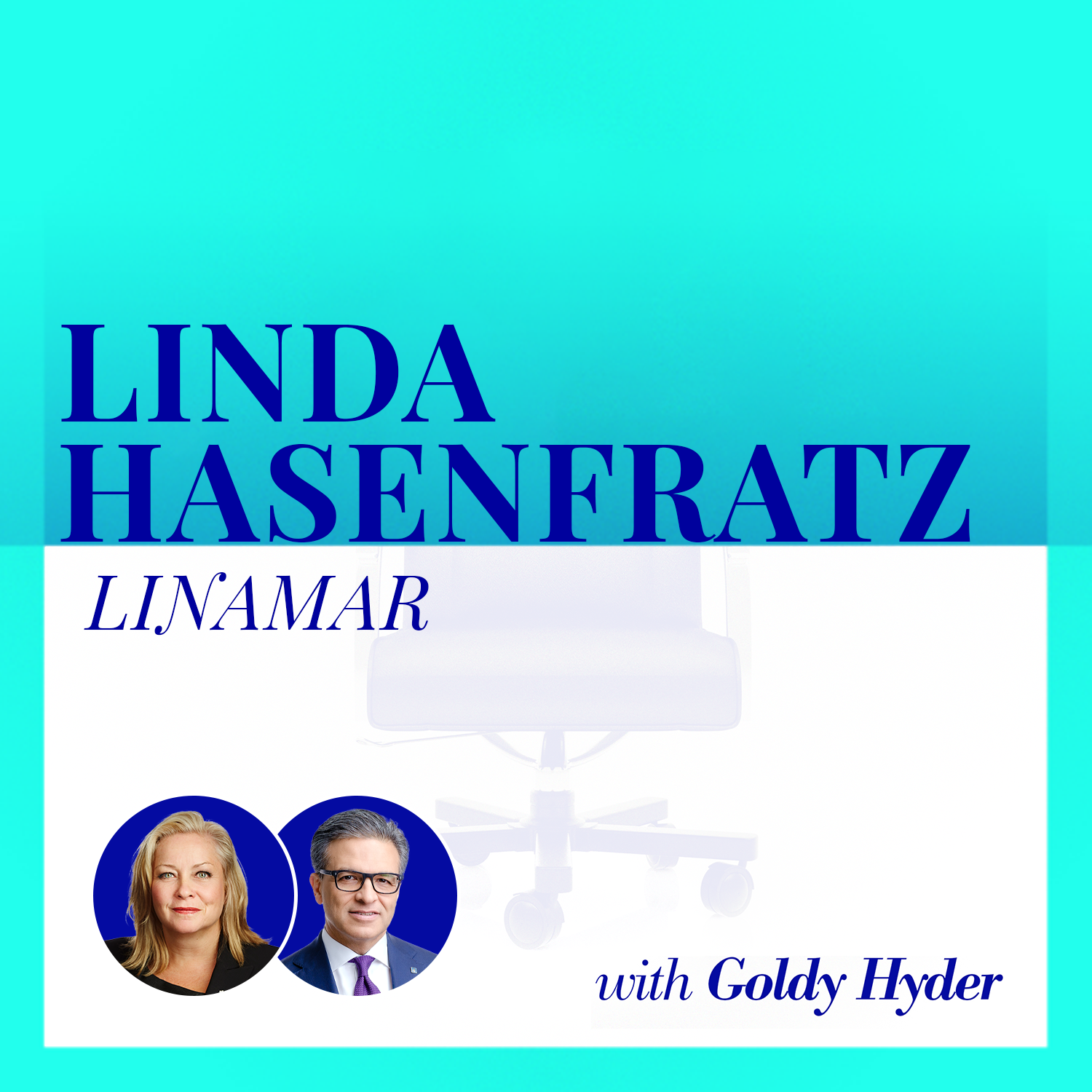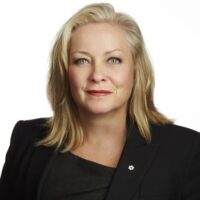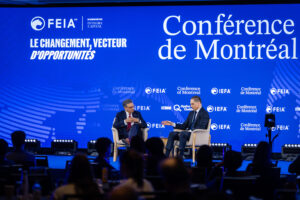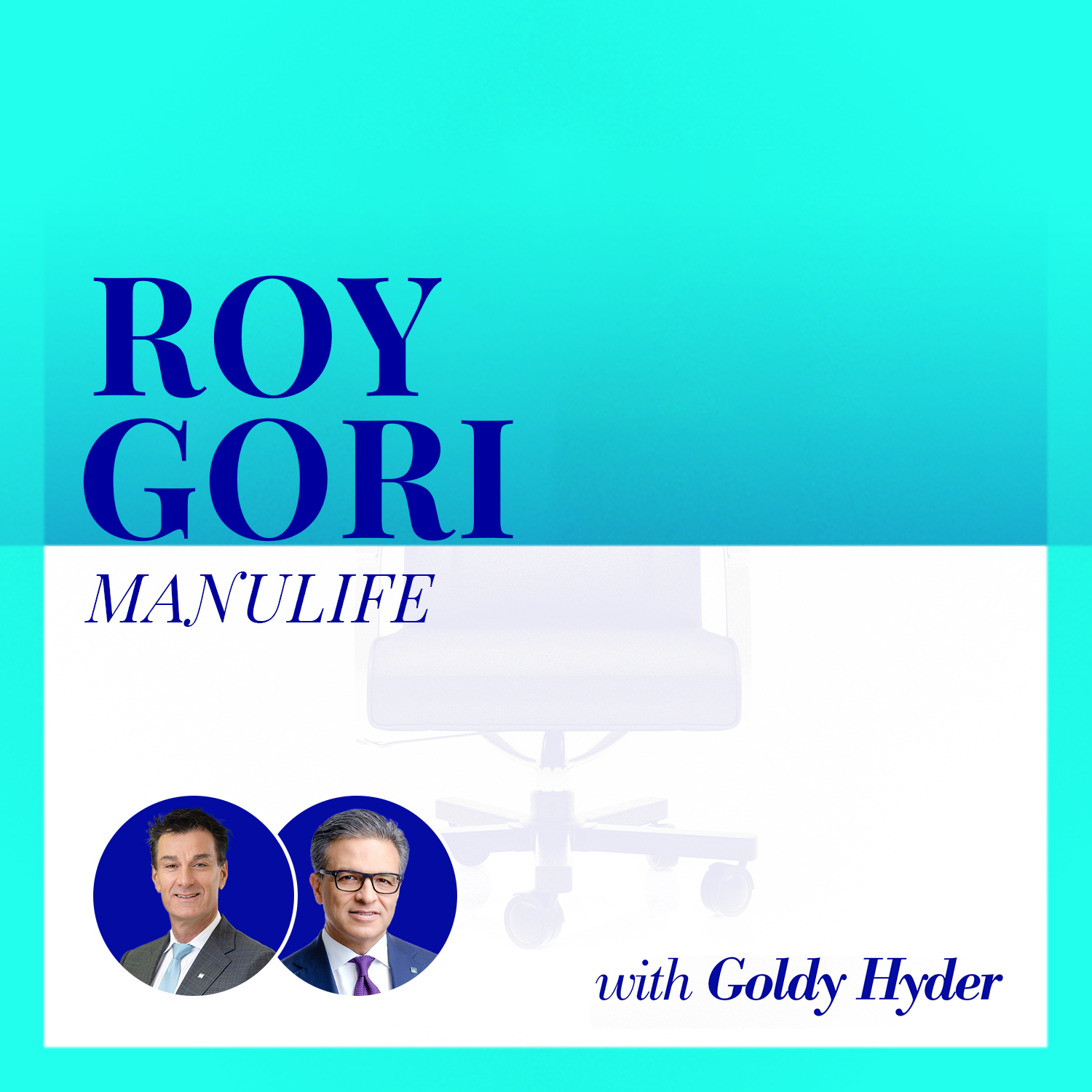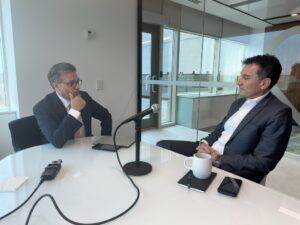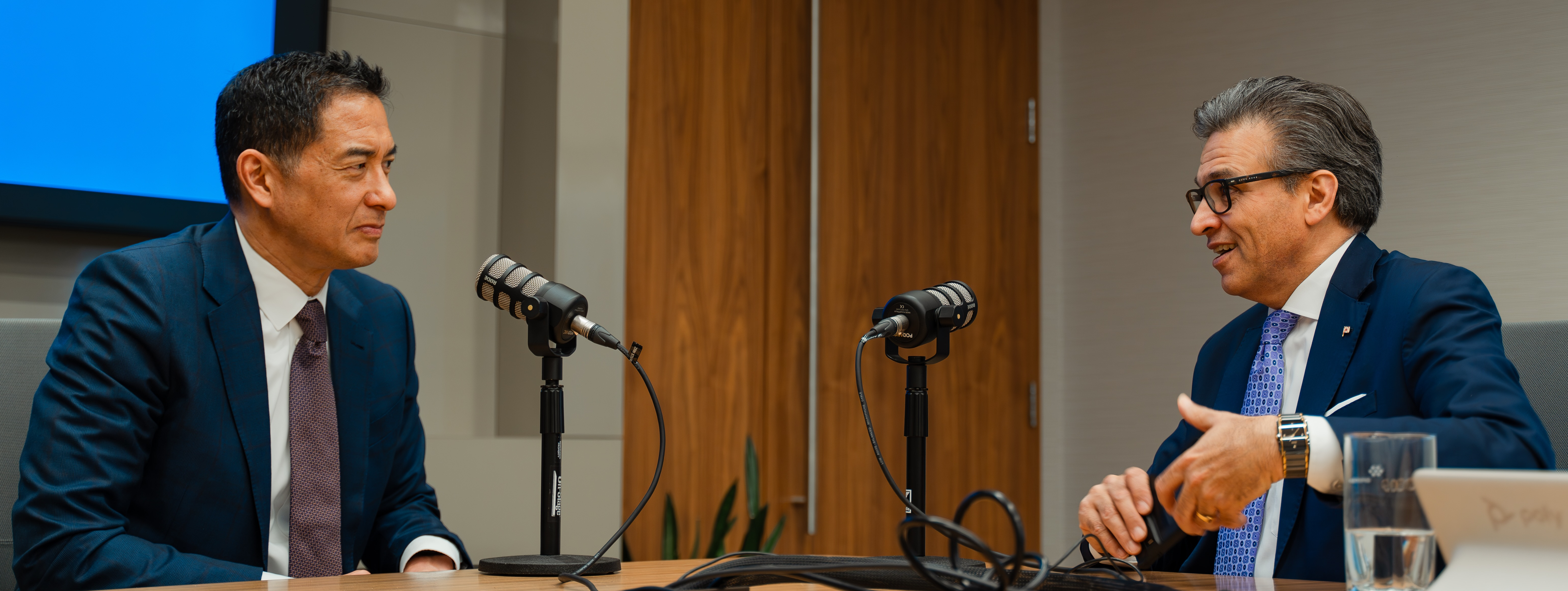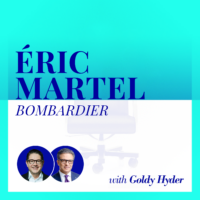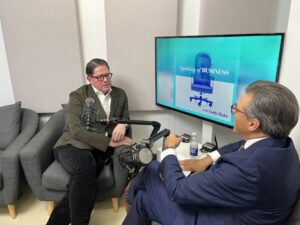Linda Hasenfratz is CEO of Guelph, Ontario-based Linamar.
Linamar is a true Canadian success story.
Linda’s father, a refugee from Hungary, started the company in the 1960s. At the time, it was just a one-man machine shop in the basement of the family home.
Today, Linamar is a diversified manufacturer with 61 plants around the world and revenues closing in on $10 billion a year.
In this episode Linda discusses her path to the C-suite, the challenges she faced in her early years as CEO, and the lessons she’s absorbed along the way about life and leadership.
Goldy Hyder:
Welcome to Speaking of Business, conversations with Canadian innovators, entrepreneurs and business leaders. I’m Goldy Hyder, president and CEO of the Business Council of Canada. Today I’m speaking with Linda Hasenfratz, CEO of Guelph, Ontario-based Linamar. Linamar is a true Canadian success story. Linda’s father, a refugee from Hungary, started the company in the 1960s. At the time it was just a one man machine shop in the basement of the family home. Today, Linamar is a diversified manufacturer with 61 plants around the world and revenues closing in on, wait for it, $10 billion a year. In this episode we talk about Linda’s path to the C suite, the challenges in replacing her father as CEO and the lessons she’s absorbed along the way about life and leadership. I hope you’ll enjoy our conversation. Linda, thank you so much for doing this.
Linda Hasenfratz:
It’s a pleasure.
Goldy Hyder:
I want to start off with an easy question. Who are you?
Linda Hasenfratz:
That’s not that easy of a question.
Goldy Hyder:
It should be easy, You should know who you are.
Linda Hasenfratz:
Well, you know, it’s interesting. I feel like who I am has really developed over time, which I think is pretty common. I mean, who I am as a leader has absolutely evolved. I’ve been influenced by a lot of fantastic leaders I’ve had the privilege of working with, I’m a wife, I’m a mother, I’m a daughter. You know, you’re-
Goldy Hyder:
You’re a Canadian.
Linda Hasenfratz:
… all these things make up a big part of who you are.
Goldy Hyder:
Now let’s start going back to when you were growing up. Before we get to the story of the company. You know, your father immigrates here to Canada, starts a business in the basement essentially, and you’re just a kid with your sister. What do you remember from those days?
Linda Hasenfratz:
Well, I remember my father being a very hardworking entrepreneur, always trying to build his business, but at the same time always really worked hard to make a balance with his family. It was really important for him to have time with his family, and I think that’s something I’ve certainly learned from him and emulate as well. I mean, no matter how busy he was, he always made sure to come home and have dinner with the family. Even if it meant he was going back to work after that and I really appreciated that. I felt like he was a big part of our lives despite having this huge job and being so successful in his business.
Goldy Hyder:
I’d read that he used to complain that he only worked half a day, 7:00 AM to 7:00 PM.
Linda Hasenfratz:
That’s what he keeps telling me, “I’m only working half days.”
Goldy Hyder:
There’s a lot of parallels with his story and so many other immigrant stories who came here and brought that work ethic. How were you able to keep that going?
Linda Hasenfratz:
Yeah. I think that working hard is absolutely a core value of who we are at Linamar. I think like anything else, if you want something to be deeply ingrained in your culture, it’s not something you just put up on the wall. It’s something you need to live. It needs to be deeply embedded in who you are, how you evaluate people, how you promote people, how you hire people, and how you talk about who you are as a company. And then I think it becomes real.
Goldy Hyder:
Tell us about the name. I know [crosstalk 00:03:17]-
Linda Hasenfratz:
Oh, Linamar is named after myself, my sister Nancy, and my mother Margaret. Sometimes my sister isn’t around. I claim the N as well, but that’s where it’s [crosstalk 00:03:27].
Goldy Hyder:
She may be listening, don’t [crosstalk 00:00:03:28].
Linda Hasenfratz:
Yes. There you go.
Goldy Hyder:
We talk a lot about your dad. You talk a lot about your dad in public, but let’s talk about your mom.
Linda Hasenfratz:
Do we have to? I’d really rather not.
Goldy Hyder:
Why is that?
Linda Hasenfratz:
Well, I lost her 10 years ago, so.
Goldy Hyder:
Yeah. But I mean in terms of the impact that she had growing up, it’s obvious your father was working very hard. She would have been an influential part of your life for you and your sister.
Linda Hasenfratz:
Oh, my mom was absolutely part of the team. Right. I think that you often see that in entrepreneurs, that they have the strong fiber of support with their spouse or their parents or their children or other members of their family. So, that was absolutely the case.
Goldy Hyder:
So a big partnership.
Linda Hasenfratz:
Absolutely.
Goldy Hyder:
Now you have kids of your own. I met, the pleasure of meeting three of your daughters and your son. How are they growing up compared to how you grew up?
Linda Hasenfratz:
Yeah, I mean, we’ve tried to raise our kids in sort of a practical way, so that we’ve tried to keep them grounded and keep them thinking practically that everything isn’t always going to be available for them. So that’s always a tough balance because when you have the ability to give your kids everything you kind of, you want to be able to do that. But at the same time you want to teach them some lessons around managing things in life and that things that you work hard for are worthwhile doing. So, we’ve tried to balance that out as best we could with our kids. And I think that they’ve turned out fantastic actually. I think that they are very balanced. They understand the importance of working hard, they understand the value of a dollar and what that means and feel like they need to work for what they want to achieve in life, that it’s not going to be given to them. And that was absolutely our goal.
Goldy Hyder:
Well, I must say first impressions matter. That was my sense is they’re very centered and very together and so clearly you’re doing a good job at that. Education is key for you. It was key in your life. It’s key in their life. You’re a Western grad. Three of them I think are in Western now.
Linda Hasenfratz:
Actually four.
Goldy Hyder:
Four of them are all at Western, great.
Linda Hasenfratz:
Yes. One’s just graduated. So I guess three still active.
Goldy Hyder:
So let’s talk about the role of education. You went to school, you studied chemistry, I think it was.
Linda Hasenfratz:
Correct.
Goldy Hyder:
And then you did an MBA. How important was that as a foundation? And again, relate that to the lives that your kids are living now.
Linda Hasenfratz:
Yeah, I mean I think education is critical. I think it’s even more important going forward as we move into this era of more and more automation of sort of repetitive tasks. There’s less and less jobs that will be available for people without skills, skills of some kind and like that’s a wide variety of skills. But to be unskilled and not have a good education in some area means it’s going to be difficult to get a job. You know, unskilled jobs are going away, they’re being replaced by jobs where people have to do more thinking, more creativity, more ingenuity, more improvement, sort of looking in the spaces in-between and trying to find new ideas of how to do things. So I think that education is a really important part of that because that’s not just going to naturally happen. We need to teach people the skills to be able to do that type of work.
Goldy Hyder:
So one of the things you were a very big part of when you were the chair, the first woman chair, of the Business Council of Canada was the business higher education round table. And being able to really put an investment into skills. And you’ve recently seen the government’s commitment to that. When you look at your employees, how concerned are you about the angst that they’re feeling and the need to reskill and retrain and the fear of robots and AI and so forth?
Linda Hasenfratz:
I feel like we don’t have a lot of fear in the company maybe because even though our jobs have been changing and we do have less direct jobs where people are actually loading and unloading machines as a manufacturing company and more indirect jobs of jobs supporting those direct folks, we’re growing as an overall organization. So direct jobs are shrinking, but indirect jobs are growing. And overall, as a company, we’re growing in terms of employment. And I think that’s absolutely key. The two have to go hand in hand. So you’re making improvements, maybe you’re automating more things, you’re creating more jobs to support those automated functions. And it’s creating innovation and competitiveness, which lets you grow your business. So you know overall your net up in terms of employment. And I think that’s really critical. It’s all got to go hand in hand.
Goldy Hyder:
Now before I go back a bit to the company and talk a little bit more about it, I mean just your answer here reminds me if anybody asked me, what jumps out at you when you think of Linda? And for me its eternal optimist. You only see the glass half full all the time. Where does that come from?
Linda Hasenfratz:
I guess it’s a little bit of who I’ve been my whole life. But, I mean, to me there’s always opportunity, particularly in times of uncertainty or when things are changing. To me that’s the time when there’s the most opportunity. And I would just rather look for the opportunity and the growth and the positive side than dwell on the negative. To me, negative doesn’t achieve anything. It doesn’t make you feel better, that’s for sure. So I’d rather look at what is positive, and how do we build on that? I just feel like it’s a better outlook and gets better results.
Goldy Hyder:
Well, we’re going to come back to that theme when I explore a little bit further some of what you had to manage in terms of adversity in the course of your life. So we’ll come back to that. But let’s talk again about the company and educate our audience about, tell us about Linamar. Where is it today? Where do you see it going?
Linda Hasenfratz:
Very exciting place. I think there’s never been more change and therefore never been more opportunity in our core automotive business, which is about two-thirds of our overall company. So over the last a decade, let’s say maybe a little bit longer, we’ve been working on diversifying our business. We’ve become a very diversified advanced manufacturing company.
Goldy Hyder:
In what areas? Because I know this is kind of not what people think.
Linda Hasenfratz:
Yeah, so again, about two-thirds of the business is automotive commercial vehicle, and about a third is in industrial businesses. So we make scissor lifts, boom lifts and telehandlers under the brand name SkyJack. And we make harvesting equipment under the brand name MacDon. So we’ve really got three quite distinct businesses, MacDon, Skyjack and the automotive business. Which are all quite independent in terms of how they run within the organization. And our transportation, automotive business, huge opportunity driving out of electrification of the vehicle as well as increased outsourcing of components and systems that weren’t outsourced in the past.
Linda Hasenfratz:
So electrification is a really exciting area of evolution in the industry, whether it’s into hybrid vehicles, battery electric or we think most interestingly fuel cell electric vehicles, which we think will more likely than not be the right long-term solution for the biggest chunk of the market in the long run. So lots of change going on. So if you’re in there with new technologies and new ideas, you are winning business. So we’ve been really excited about that. We’ve won a ton of business for electrified vehicles over the last few years. Not surprisingly because there’s so much focus and development going on in those areas, and our customers are looking to launch them.
Goldy Hyder:
You’re a long-term thinker, 2100 plan, a plan for Linamar in 2100, and I saw on some of it the diversification around things like power, which you’ve mentioned, but water and aging.
Linda Hasenfratz:
Yes. So what we did is take a look at sort of key trends that we saw happening on a global basis that we thought had long-term impacts, that would be shaping our future over the next 50 to a hundred years. So markets were already in like transportation, whether it’s automotive or commercial vehicle, infrastructure, which is our SkyJack business, food and agriculture, which is our MacDon business. All of these areas we saw huge opportunity because urbanization is a key trend. That means we are going to move around differently. A growing global organization that needs food and clean water, an aging population that needs new ways to manage, whether it be medical devices or just assist devices to help an aging population get around and manage in their own homes, were all areas that we thought were interesting markets that would really be significant over the next 50 to a hundred years. So we’ve identified those six markets as ones that we want to develop strategies in and start to develop business in.
Goldy Hyder:
All right, so let’s go not to 2100, but let’s go back to you come out of school instead of joining the company, you’re going into pharmaceutical sales. You’ve described that period as a great period of learning to see how others do things. And then you arrive at the company. What do you remember from those days?
Linda Hasenfratz:
Well, I worked, as you say, for a year or so in the pharmaceutical industry, and I think I sort of proved to myself I can make it on my own. I don’t need my dad to give me a job to be successful. So I think that’s an important lesson to learn.
Goldy Hyder:
Did you always want to be in the business? Did you know that you were going to go [crosstalk 00:13:02]?
Linda Hasenfratz:
No, I didn’t actually, that was not my intent.
Goldy Hyder:
That turned out well.
Linda Hasenfratz:
And then I found myself surprisingly thinking, you know, at the time Linamar was I’d say less than a hundred million in sales. And I thought, “You know, if I play my cards right, I could be running $100 million company one day.” So I decided that I did want to do that and I did want to join in and be part of the legacy that my father had created. And when I started, we decided to the best way to go was getting a really broad perspective on the company. So working in every different areas starting on the shop floor.
Linda Hasenfratz:
So I started on the shop floor running a machine and learning the basics of our business of metal removal or what’s that all about and what’s that job like. And I think that was critical to do that. And I think it’s really important to start at the bottom and work your way up. One of my dad’s favorite lines, because he has a lot of them, is the-
Goldy Hyder:
I’m coming to that later too, by the way.
Linda Hasenfratz:
… is, “The only job you start at the top is digging a hole.” So we don’t want to do that. So that was great. That taught me a lot. And then I moved around the company into all kinds of different disciplines and really got a great perspective from quality, finance, estimating, engineering every area of the company to really understand how all the pieces came together, which was invaluable to me in many ways.
Goldy Hyder:
And now your first C-suite role became CEO.
Linda Hasenfratz:
Correct.
Goldy Hyder:
I’ve often explored this area with other CEOs, but I find that CEOs and COOs are different people. And yet you’ve now had both roles.
Linda Hasenfratz:
Yeah, I mean, for me the operational role was a natural because I came from the operations. I mean, at the time that I was promoted to Chief Operating Officer, I was running three plants. I’d launched two plants and was running them and was in the process of launching my third plant. So that’s where my strength was. That’s where all my experience was, was operationally. So that made a lot of sense. And from there it was about developing my more strategic thinking to learn to think a little bit farther ahead and develop strategies for the future. And I learned that on the job. I learned it also in my MBA, which I found an invaluable complement to the practical operational experience that I was getting on the shop floor to help broaden my thinking. And then it is a little bit baptism by fire.
Linda Hasenfratz:
I mean, you’re in it, you’re trying to learn about markets and understand about where those long-term opportunities are and complement the operational expertise.
Goldy Hyder:
Well, you had a great, I think it was your quote that said, “Make strategic decisions slowly and operational ones quickly.”
Linda Hasenfratz:
Exactly. I think both are really important to think about because I think that a lot of companies spend way too long thinking about things that should just be decided quickly. You know, to me I tried to taught to evaluate decision, how long you spend on a decision should be proportionate to the consequence of the decision. So if the consequence is this week or next week, then spend seconds on the decision, you don’t need to study it for months. But on the other hand, if the consequences are years, then you should spend some time evaluating the alternatives.
Linda Hasenfratz:
And I think companies make mistakes on both ends of that spectrum. They can spend too much time on things they should decide on quickly and die a slow death of buried in bureaucracy, but others can make bad decisions for important strategic decisions by making them too quickly and die a fiery death from that. So I think you need to balance both.
Goldy Hyder:
All right. Before we head into one of the topics that we do cover on this podcast with our guests is all about leadership. I thought we’d just take our listeners through that moment when you and your dad had the infamous conversation about you’re ready to be CEO. Tell us about that.
Linda Hasenfratz:
Yeah. So my dad had come to me in 2002 and said, “I think you’re ready to take on the CEO role.” And I said, “Well, that sounds great. So what are you going to do?” And you know, he’s like, “Oh well, the same thing I’m doing now.” It’s like, “Well that’s probably not a good idea. So we should-“
Goldy Hyder:
How old were you, if you don’t mind me asking?
Linda Hasenfratz:
Let’s see, that was 2002, so I would have been 36.
Goldy Hyder:
Right, so you’re 36 years old. You’re looking at your dad who started this business in his basement. And basically looking at him and saying, “I want to run it.”
Linda Hasenfratz:
Right. That’s right.
Goldy Hyder:
And you negotiated that.
Linda Hasenfratz:
I said, “I think we should identify the things that you’re going to do and then we know that that’s what you got to focus on.” So we went back and forth for weeks, in fact around what that-
Goldy Hyder:
Without lawyers I’m assuming.
Linda Hasenfratz:
Without lawyers present know about what that should be. And eventually I cornered him on an airplane and we agreed on the four things that he was going to do. And because he’s the one who taught me to do it, I wrote it down on a piece of paper and I made him sign it and I still have it in my desk drawer just on the off chance he strays off track.
Goldy Hyder:
Honestly, have you had to pull it out?
Linda Hasenfratz:
Maybe once in a while.
Goldy Hyder:
Maybe once in a while you’ve had. Something tells me you’d have to used that with him.
Linda Hasenfratz:
Yeah, absolutely.
Goldy Hyder:
Because this is passion for him.
Linda Hasenfratz:
Yeah, for sure.
Goldy Hyder:
This is his other baby, if you will.
Linda Hasenfratz:
Yeah. Yeah, that’s right.
Goldy Hyder:
All right, well, thanks for sharing that story. Now let’s talk about leadership. As I said, this is one of the areas we love to explore, and given who we’re interviewing on these podcasts, let’s start, what does it mean to you? What is leadership?
Linda Hasenfratz:
Yeah, I think that leadership I is a little bit genetic. Like you have to have that little bit of a nugget of something inside you that walks into a situation and can take control and people will rally around you. An ability to have a vision and then gather people around you who will support that vision.
Goldy Hyder:
So before you leave that, it’s instinctive, you’re born with it.
Linda Hasenfratz:
I think that there is a nugget of that, but I do think that it’s also learned. So I think that you have to have a little bit of that instinct inside you to be a good leader. But I think that you also learn from leaders that you’ve worked with, maybe leaders you’ve observed in the industry or read about. And you know, certainly I think my leadership style has definitely been impacted by the leaders that I’ve worked with. Obviously most predominantly my father, who I’ve worked with closely for so long-
Goldy Hyder:
Are you similar leaders or different leaders?
Linda Hasenfratz:
We are different leaders.
Goldy Hyder:
How so?
Linda Hasenfratz:
I think. So I mean, many things that he taught me I embrace as well. So things like moving quickly, let’s act today instead of waiting for tomorrow.
Goldy Hyder:
He’s not a bureaucrat, is he?
Linda Hasenfratz:
No, definitely not. Let’s look for opportunities to grow, build relationships and care about the small things and the big things and just push for success every day. Other leaders in our business, our Chief Operating Officer and President, Jim Jarrell is an amazing leader. I’ve learned a lot from him. I worked for him in the past in Linamar and he’s an amazing negotiator, very creative, [inaudible] great at relationship building and marketing and selling and growing. So I’ve learned a lot from him as well.
Goldy Hyder:
So how are you different than your dad?
Linda Hasenfratz:
I think that my approach, as opposed to my father, is much more team focus, I want to involve my team, I want to get feedback on their ideas and then implement. So I’m not looking for consensus, but I am looking for feedback to better inform my decision. I think that I am more process oriented than my father.
Goldy Hyder:
That’s the upside. Right?
Linda Hasenfratz:
Maybe, that’s right. And I think that that’s actually been helpful as we’ve grown because my father is a very instinctual leader and acts based on instinct, and his instincts are fantastic. Whereas I like to do that. But I also like to have a bit of process in behind it. And so I feel like that’s something that we’ve really done a lot more of in the last 10 15 years at Linamar is to try and identify what are the things that we really, really need to do right to be successful? And let’s develop some systems around that so that we can all follow those systems.
Linda Hasenfratz:
We can still be entrepreneurial, but like these six things, we’re going to do the same. And I think that that balance is really, really important in an entrepreneurial company. If I think about a spectrum of sort of corporate control from zero to a hundred percent of corporate making all the decisions as opposed to plants and folks in the business making decisions, when the corporate control is zero, I think that when corporate control is zero, you have fantastic innovation. People are coming up with great ideas, you’ve got great accountability and ownership over decisions because they’re the ones making the call. But you can open yourself up to risk because everybody’s doing things differently. And there’s a bit of lack of consistency.
Linda Hasenfratz:
But on the other end of the scale, if you’re in a very centralized organization where everything is totally controlled, you’ve mitigated risk. But I feel like you’ve also destroyed accountability and innovation. So we prefer to be down at the like, let’s say 20% end of that spectrum, which I recognize could open us up to risk, but what we’ve done is identify sort of five, six key areas that we do want everybody to do the same way that we feel mitigate the risk and help ensure consistency of performance for shareholders, customers and employees, but leaving enough decision making at the plants to still drive that entrepreneurism, innovation, accountability and ownership.
Goldy Hyder:
Well, you must be doing something right. I mean, I don’t have the time on the show to go to the all the recognition you’ve received and all the awards that you’ve gotten, but I’m wondering in that journey of becoming as successful and as recognized as you are for being the leader that you are, where are the moments in that journey where you can look back to and say, “That helped me be a better leader?”
Linda Hasenfratz:
Well, I don’t know that there are specific moments. I think that I-
Goldy Hyder:
Some say 2008 might’ve been that moment.
Linda Hasenfratz:
Oh, well, I mean, I think many leaders learned a lot from that timeframe. Certainly it was a very difficult time in business. Our approach was to be very focused. Communication was absolutely key. I think that when times are uncertain you need, your communication needs to triple or more in efforts. Because when people don’t know what’s happening they get scared. And so we over-communicated in that timeframe both with our own employees and with other key stakeholders like our shareholders that we were going out to, I was going out to personally to meet with and talk to about what was happening. And I was told later that I was one of the few CEOs that actually came out and met with people in that timeframe and that they really appreciated that opportunity.
Linda Hasenfratz:
Because even though I didn’t have all the answers, at least I could talk about what I knew and what our plans were. And I think that it just helps to gain some confidence. And you know, we had a clear plan with our people. We’re going to cut costs, we’re going to conserve cash and we’re going to grow. We really felt like the more that we grow, the less we have to cut.
Goldy Hyder:
There’s that optimist again.
Linda Hasenfratz:
Yeah. Again. We really focused on that, because we wanted to grow our way out of the situation. We knew we had to cut but we wanted to grow as well.
Goldy Hyder:
How hard was that for you? The cutting.
Linda Hasenfratz:
The cutting? it was difficult for sure because when your business drops 30%, you’re not-
Goldy Hyder:
Literally over night, yeah.
Linda Hasenfratz:
… this isn’t that layer at the top that, “Okay. If they go, that’s all right.” You’re getting pretty deep into the organization and so it was difficult for sure.
Goldy Hyder:
Were you scared?
Linda Hasenfratz:
I don’t think I was ever scared. I was very focused.
Goldy Hyder:
A lot of big people fail [inaudible 00:25:27].
Linda Hasenfratz:
I was very focused on where we needed to go. I was very confident we were going to get there. I did not feel that we were going to fail. I knew where our risks were and I knew that the areas of risk were not high enough to put us under, I knew that.
Goldy Hyder:
But you just lost two of your main customers who went bankrupt.
Linda Hasenfratz:
We didn’t lose them. They went through chapter 11. At the time that they did, they had dwindled down so much in terms of production and sales that receivables outstanding were actually pretty small. And further, we had insured those receivables. So I knew that certainly wasn’t going to take us down. We had long focused on trying to ensure that we didn’t have any one customer more than 20% of our sales so that we didn’t have all our eggs in one basket. So we had mitigated risks from that perspective early on as well. And I knew even if I had to fully write off the receivables that were outstanding at that time, that we would survive that.
Goldy Hyder:
One of the decisions that your father credits you for, where he says so much that I would not have done this and yet it’s probably the biggest reason the company grew as quickly as it did, and as successful as it is or one of the biggest reasons. And that is your decision to go into China. What took you there?
Linda Hasenfratz:
Well, I mean, China was growing rapidly and clearly was on track to be quite a significant player in the automotive market. And today it’s the largest automotive market in the world. They’re making 24-25 million vehicles there. Compared to 17-18 million in all of North America, there’s 24-25 million just in China and 45 million in Asia. So clearly having a footprint in Asia to supply that market was critical. And I think what’s important to note is we never went to China to supply North America or Europe. We always planned to supply North America and Europe from those continents. We went to China for China, or Asia, let’s say more broadly. Because we saw the opportunity in that market.
Linda Hasenfratz:
Today we have seven plants in Asia, five in China, two in India, and see lots of opportunity for continued growth. Now, that said, we have 60 plants worldwide. So we have 53 plants that aren’t in China that are seeing huge growth opportunities as well. Notably right here in Canada, where we’ve probably seen our strongest growth over the last few years with huge opportunities that we’re seeing and new products being outsourced that our customers never did before in North America.
Goldy Hyder:
Now you and I spent time together, of course, recently on the whole steel tariffs issue. Luckily resolved now. And everything we went through on the so called new NAFTA, and I know you to be a person of tremendous focus on the facts. And here we are dealing with a complicated issue in China. How frustrating is it for you when you see things that are clearly wrong and yet they’re beyond your control?
Linda Hasenfratz:
Yeah, it’s obviously frustrating, particularly when it’s controllable. So I feel like the whole last year of metal tariffs in North America was not a useful exercise. It just created a lot of costs basically for American companies because that’s who pays the tariffs. Right? And I think that that’s something that was not, it still is not well understood, particularly in the US, that it’s American companies paying tariffs to import goods for higher cost. So the impact to our bottom line was actually pretty minimal.
Linda Hasenfratz:
But I look at our customers in the US and they are spending billions or had been spending billions and are still spending a lot of money on China tariffs. Half of their profit was being funneled into US Treasury instead of important places like developing electrification, developing autonomous vehicles, developing new forms of mobility. I mean, they’re obviously investing in that, but they have been restricted in their ability to invest in that because instead they’re funding the US Treasury when competitors around the world don’t have that restriction. And it really worries me that we’ve been hindering North American competitiveness by hindering our ability to invest in the future and instead invest in US Treasury. That doesn’t make sense to me.
Goldy Hyder:
Mindful of your time. I’m going to move a little bit to more personal stuff with you. We mentioned earlier you’re a big believer in education. You gave for your family and others $5 million to Western, particularly for women leadership.
Linda Hasenfratz:
Right. Women in the dual degree engineering and business. So it wasn’t just women leadership, it’s women technical leadership. So I think it really encompassed several areas that are really important to me personally and to us as a business at Linamar. One is encouraging more people into science, technology, engineering and math, which we think is really critical. Again, because we need new skills for the jobs of tomorrow and many of them are technology-based, so there’s a huge demand for people with the skills that you get by a STEM education. So it’s really important to us to invest in encouraging STEM broadly.
Linda Hasenfratz:
We have particularly focused on encouraging STEM and trades for that matter with women because historically they’ve been underrepresented in those areas. Although it’s great to see the fantastic progress that we’ve seen of women in STEM over the last 10 or 15 years. I mean, today, the University of Toronto Engineering Program is 42% women. Last year it was 41% women. I mean, they’ve made enormous strides. So, we are rapidly leaving behind us this idea that women are not in STEM. But nevertheless, I wanted to continue to encourage that. And I particularly like the dual degree program because you’re bringing the technical skills alongside business and leadership skills. And I think that’s really a great recipe for the future.
Goldy Hyder:
Now your dad is, speaking of quotes from your dad, he calls you a party girl.
Linda Hasenfratz:
Well, I guess I gained that reputation with him as a teenager and it sort of stuck. But I wouldn’t call myself a party girl, but I will say that I am a social person.
Goldy Hyder:
I read that your kids had believed that every single weekend it was normal to have people over, until they realized-
Linda Hasenfratz:
Well, that’s true. That’s true. That’s true. So I do think it’s important to have a balance in life. So you have your business, you have your family, you have your personal life, your social life. And I think, to me, live every moment of your life, it’s too short not to.
Goldy Hyder:
And how do you find that balance? I mean, you’ve got four kids, a husband, you’re more than just the CEO of Linamar. How do you do it?
Linda Hasenfratz:
Yeah, I mean, be organized.
Goldy Hyder:
There’s that CEO again.
Linda Hasenfratz:
I think is the first thing. Have a great team around you, obviously at work, but at home as well, that can help you do all the things that you want to do. And set out to do those things and do it, you can do so much more than you think that you can.
Goldy Hyder:
Right. When those kids were growing up, you must have been busy, any, any?
Linda Hasenfratz:
I was absolutely busy. I don’t have regrets. I mean, I feel like I always tried to make that balance work. You don’t balance every minute, right? I mean, you balance over time. You may have a stretch of time where you’re having to do a lot of family stuff because your kids are young or they’re sick or something’s going on. And then there’s other times when your business is all encompassing and you’re very focused on that.
Linda Hasenfratz:
And I think you shouldn’t try and focus every minute or even every day, you focus over time. And I feel like I was there for the important things for my kids. I made sure that I was, I worked long hours during the week, but I reserved weekends for my family as best as I could.
Goldy Hyder:
Parties.
Linda Hasenfratz:
Exactly. And I think I made that work and I found other ways to make sure that I had time with my kids when they turned 12. I told them I would take each of them on an international trip with me once a year. So we had a week or two together, it was just the two of us, which was fantastic. With a big family, you don’t get that very often. So, it doesn’t just happen. You do have to think about it and make it happen. But I do think it’s possible to do it.
Goldy Hyder:
So how do you relax?
Linda Hasenfratz:
Well.
Goldy Hyder:
Do you relax?
Linda Hasenfratz:
Absolutely. I think so. I mean, I do like to entertain and socialize, so I enjoy doing that and I enjoy sport. I work out every day. I like to run or do some other type of exercise. And I think that also is really important in terms of balance and health and energy levels for that matter. I mean, if I get up and I have a great workout, I’m energized and ready to go for the day.
Goldy Hyder:
I was hoping you’d say you listen to our podcast to relax.
Linda Hasenfratz:
Oh, that, I mean, that goes without saying.
Goldy Hyder:
It’s a given, right.
Linda Hasenfratz:
Yeah. It’s a given.
Goldy Hyder:
Managing stress. How do you deal with stress?
Linda Hasenfratz:
Again, I think exercise, having a great workout is a great way to work out stress. Having people you can talk to. I mean for me, I’m really lucky because I’m surrounded by all these great leaders. As I say, my father, Jim, our president, my husband, who’s an entrepreneur and a business leader himself, and helps keep me grounded and gives me good advice whether I want it or not.
Goldy Hyder:
Sometimes, he says the same thing about you.
Linda Hasenfratz:
So that’s helpful.
Goldy Hyder:
And where do you get the energy from? I mean, you’re always on, you’re happy, you’re energetic, you’re positive. Where does that come from?
Linda Hasenfratz:
I mean, I think I’m naturally an energetic person. I think, again it comes from being dedicated to a healthy lifestyle and exercise, regular exercise. And I don’t know, I mean, just a few cups of coffee doesn’t hurt.
Goldy Hyder:
I guess not. Do you think you’re an introvert or an extrovert?
Linda Hasenfratz:
I think of it extrovert.
Goldy Hyder:
You are. Okay. I’m asking because sometimes people who come across that way are actually quite private and-
Linda Hasenfratz:
Okay. Now that’s-
Goldy Hyder:
Extroverted as advertised.
Linda Hasenfratz:
As advertised.
Goldy Hyder:
As advertised.
Linda Hasenfratz:
Exactly.
Goldy Hyder:
How do you learn? How do you keep up [crosstalk 00:35:59]?
Linda Hasenfratz:
You know, I try and learn something every day, whether it’s within our organization of something innovative one of our plants is doing that is really fantastic. Or I read the news a lot. I’m a bit obsessed even by constantly keeping up on what’s going on out there and learning and reading and understanding the facts. As you said, I’m a big believer in fact-based decisions. I don’t want to base a decision, particularly an important one on hearsay. I want to see the facts and really understand what makes the right sense. And that means reading a lot and really understanding what’s happening. Talking to people, meeting people, finding out what they know. I mean, there’s a million ways you can learn.
Goldy Hyder:
And how long are you going to keep doing this?
Linda Hasenfratz:
Well, I mean, I love what I do and I of course want to continue to play a leadership role at Linamar. That doesn’t have to be CEO. It can be different roles as well. So we’ll see what the future holds.
Goldy Hyder:
You better pull out that sheet of paper. Maybe one of those kids will come to you and say, “Hey, mom, I need to sign here.”
Linda Hasenfratz:
That’s right. That’s right.
Goldy Hyder:
Before we wrap up, we like to play a bit of a word game. And before we do, I just want to ask you one question and that is, what’s the one word that describes you?
Linda Hasenfratz:
I think passionate. Optimistic. Engaged. Excited about the future.
Goldy Hyder:
I would have guessed those, to tell you the truth. All right. The word game we play, as I said, is I say a word, you say what comes to your mind, then we’ll wrap it up.
Linda Hasenfratz:
Okay.
Goldy Hyder:
Family.
Linda Hasenfratz:
Love.
Goldy Hyder:
Trump. Don’t say hate.
Linda Hasenfratz:
That’s a tough one. That’s a tough one. I think challenge.
Goldy Hyder:
Leadership.
Linda Hasenfratz:
Opportunity.
Goldy Hyder:
China.
Linda Hasenfratz:
Opportunity.
Goldy Hyder:
Father.
Linda Hasenfratz:
Inspiring.
Goldy Hyder:
Passion.
Linda Hasenfratz:
Passion? Excitement.
Goldy Hyder:
Disruption.
Linda Hasenfratz:
Excitement.
Goldy Hyder:
Innovation.
Linda Hasenfratz:
I think innovation is at the root of our ability to compete. So competitiveness.
Goldy Hyder:
Great. Canada.
Linda Hasenfratz:
Awesome country.
Goldy Hyder:
Thanks for doing this, Linda.
Linda Hasenfratz:
Thank you. It’s been great. It’s a lot of fun.
Goldy Hyder:
Thanks again to Linda Hasenfratz for being my guest on this episode of Speaking of Business. Subscribe now for more conversations with Canada’s top innovators, entrepreneurs, and business leaders, search Speaking of Business wherever you find podcasts, or visit speakingofbiz.ca to join our email list and follow us on social media. Until next time, I’m Goldy Hyder.





